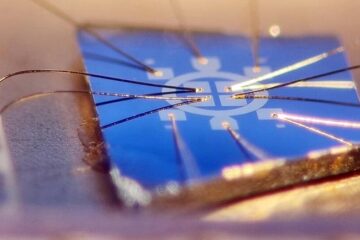€43 million for research projects to boost European agro-food research

While visiting Wageningen University and Research Centre in the Netherlands, European Research Commissioner Philippe Busquin is attending today an expert seminar on the trends affecting agriculture and food production. Agro-food research today has to respond to challenges, such as agriculture policy reform, enlargement of the European Union, international trade issues, new technologies and rapidly evolving consumer attitudes. On this occasion three major new projects are being launched in the agro-food area that the EU is to support with research funds totalling €43 million through the Sixth Research Framework Programme (FP6). The projects launched are the first major FP6 activities which take the „farm-to-fork“ approach. SAFE FOODS is an integrated project on risk analysis in food safety, which aims to improve consumer protection, NuGO is a network of excellence to integrate genomics, nutrition and health, and WELFARE QUALITY is an integrated project on animal welfare and food production (see annex).
“Meeting consumers’ expectations for good and safe food, while at the same time ensuring sustainable agriculture and fostering a competitive industry, requires ambitious R&D efforts and strong cooperation at European level. Consumers increasingly demand to know where their food comes from and what it brings them. That is why we develop in the EU Sixth Research Framework Programme a new „farm to fork“ approach, which opens new perspectives for producing food that responds to environmental, health and competitiveness objectives,“said Research Commissioner Busquin.
Taking up the new challenges
“We are now moving into an era of industrialised food production, processing and distribution where the focus of research changes. Science is producing challenging technologies; globalisation brings new risks as well as benefits; and concerns for ethical and environmental issues have moved high on the agenda,” comments Prof. P. Cunningham of Trinity College, Dublin, leading expert in agro-food production and member of the European Group on Life Sciences (EGLS).
“Agricultural research has already started to react to some of these changes by re-orienting and adapting its research agenda… Perhaps the most important example is the change from a production- to a consumer-orientation and the importance attached now to food quality and safety,” states Dr. M. Lückemeyer of EURAGRI and Director-General in the German Federal Ministry of Consumer Protection, Food and Agriculture.
The European Commission has been working with EURAGRI since December 2000 to conceive a European Research Area for agriculture research. Dr. Aalt Dijkhuizen, president of Wageningen University and Research Centre, presents his organisation’s approach to respond to these new challenges.
The seminar is followed by presentations of three of the twelve major new projects selected for funding in the area of “Food Quality and Safety” during the first round of FP6. Commissioner Busquin is visiting Wageningen University and Research Centre to see ongoing agro-food research and meet Marie Curie fellows and other young foreign researchers currently working at Wageningen UR.
Responding to current concerns, and anticipating future needs
Already a major drive to construct the European Research Area for agriculture and food research is supported through the Sixth Research Framework Programme (FP6), which provides new research funding instruments. Thus, the thematic priority “Food quality and safety” supports EU research for the consumer with a novel “farm-to-fork” approach. It covers the total food chain with particular attention to food quality, food-related diseases and allergies, the impact of food on health, traceability, safer and environmentally-friendly production methods, and environmental health risks. In this area the research community has readily embraced the new concept as demonstrated by the 12 large “new instrument” projects short-listed for EU support in the first year of the programme with a total contribution approaching €200 million. These are complemented by 12 other research projects and 15 specific support actions.
Networks of Excellence have been established to tackle allergy problems; to prevent and control prion diseases; to link genomics to nutrition (NuGO); to assess risks from chemicals in food; and to study animal diseases.
Integrated projects are being launched to improve quality and safety in the organic and low input chain; to examine the impact of diet on health; to improve grain legumes in food and feed; on the quality, safety and health benefits of seafood; to improve food safety through integrated risk analysis (SAFE FOODS); and to integrate animal welfare in food quality (WELFARE QUALITY).
The second call for proposals in the food area, which closes on 5 February 2004, is designed to cover a number of additional critical issues including traceability of food (including GMOs in the context of coexistence); the creation of a food information database for Europe; gene-nutrient interactions and obesity; Nutritional and lifestyle habits of adolescents; the effects of early nutrition on long-term health; monitoring and preventing chemical contaminants in food products; using of plant biodiversity to reduce chemical use; environmental cancer risk and nutrition; improving the quality and safety of beef and of poultry.
With the new work programme for the years 2005 and 2006, the European Commission is presently preparing the focus for food quality and safety research within the second half of FP6. This period will take into account research activities not covered in the first 2 years of the programme as well as new issues, such as emerging diseases, new consumer trends, or newly revealed challenges in industrial food production.
The European Commission also recently announced the support of the “European Research Area – Plant Genomics” project to coordinate the national programmes in plant genomics area of ten EU member states and Norway, see IP/04/131.
Media Contact
Weitere Informationen:
http://europa.eu.int/comm/research/press/2004/pr1901en.html http://www.cordis.lu/food/home.htmlAlle Nachrichten aus der Kategorie: Förderungen Preise
Neueste Beiträge

Neue Industrie-4.0-Lösung für niedrigschwelligen Zugang zu Datenräumen
»Energizing a Sustainable Industry« – das Motto der Hannover Messe 2024 zeigt klar, wie wichtig eine gleichermaßen leistungsstarke und nachhaltige Industrie für den Fertigungsstandort Deutschland ist. Auf der Weltleitmesse der…

Quantenpräzision: Eine neue Art von Widerstand
Physikforschende der Universität Würzburg haben eine Methode entwickelt, die die Leistung von Quantenwiderstands-Normalen verbessern kann. Sie basiert auf einem Quantenphänomen namens anomaler Quanten-Hall-Effekt. In der industriellen Produktion oder in der…

Sicherheitslücke in Browser-Schnittstelle erlaubt Rechnerzugriff über Grafikkarte
Forschende der TU Graz waren über die Browser-Schnittstelle WebGPU mit drei verschiedenen Seitenkanal-Angriffen auf Grafikkarten erfolgreich. Die Angriffe gingen schnell genug, um bei normalem Surfverhalten zu gelingen. Moderne Websites stellen…





















